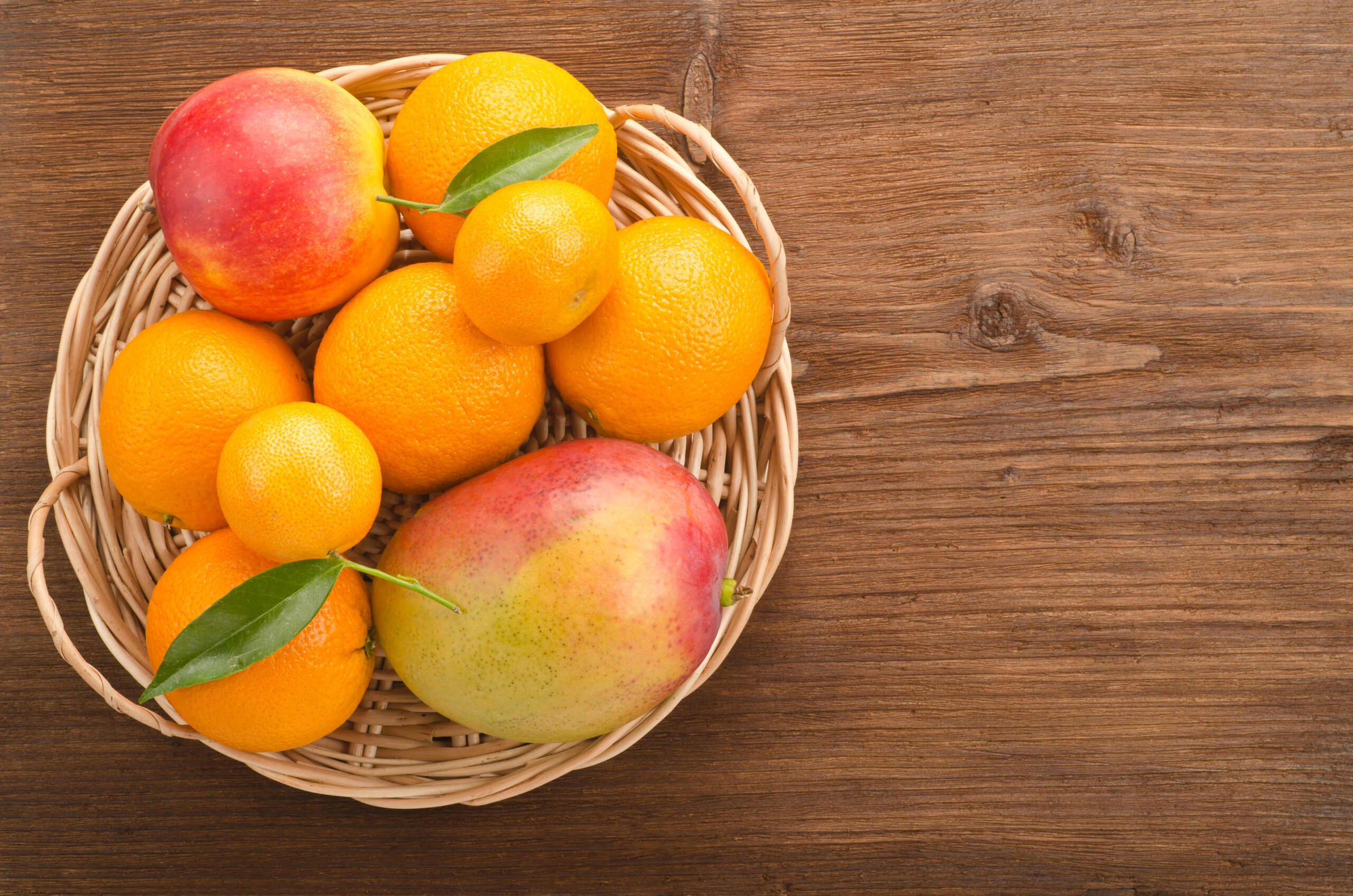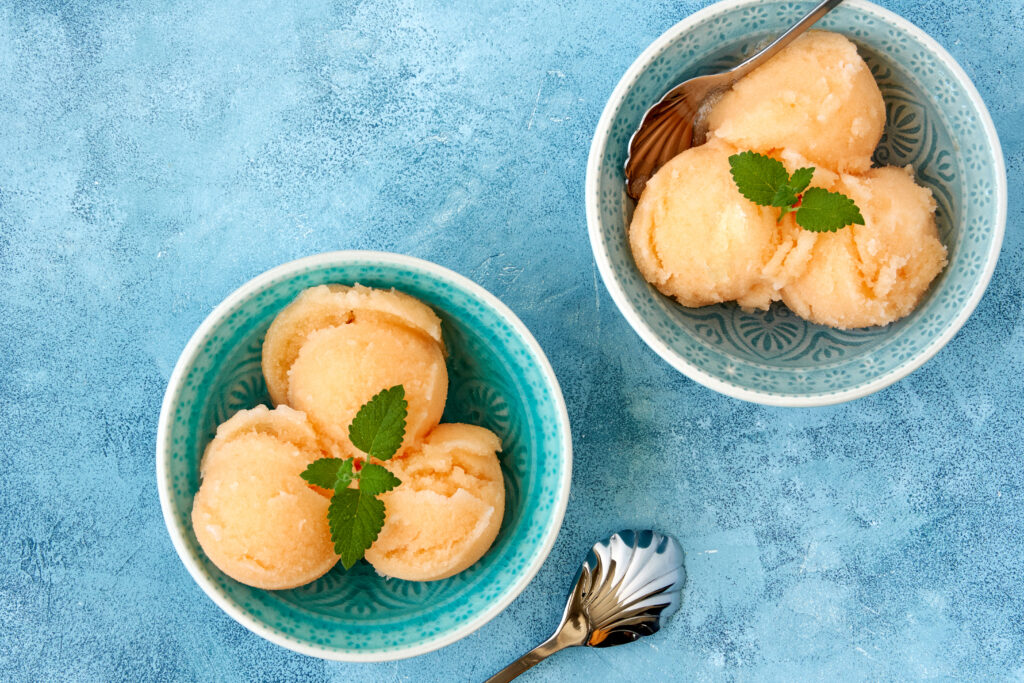

Who says you cannot have ice-cream? Food is to be enjoyed and there is nothing nicer than ice cream on a hot summer’s day. Fresh, juicy fruit can be easily turned into a tempting sorbet. For a special treat that is not only delicious but healthy – try this amazingly refreshing sorbet!
Eastern View: All parts of a mango have medicinal uses including the bark, leaves, flowers, and seeds Texts of ayurveda mention various herbal preparations using different parts of a mango tree.
The mango bark, flower, leaves, and seed kennel are astringent and cause dryness of bodily tissues. However, ripe mango fruit is sweet to taste and increases sliminess and mucous secretion. Raw green mango is sour in taste and can aggravate all three doshas.
Ripe mango balances vata and pitta. It helps to relieve constipation and normalize digestion. Consumption of ripe mango increases hemoglobin in blood and is very useful in treating anaemia. Ayurvedic texts eulogize the uses of ripe mango as an aphrodisiac. It is known to rejuvenate male reproductive system and increase quality and quantity of semen. It also increases sexual energy (as it nourishes rakta dhatu) and stamina. Thus it helps in erectile dysfunction and low libido. Ripe mango strengthens the body, increases body bulk and increases a glowing skin
The bark, flowers, leaves and seed kernels are used to prevent bleeding and to heal chronic wounds. These also help in controlling diarrhea and dysentery. The seeds help to eliminate intestinal parasites and to control dysfunctional uterine bleeding. Seed kennel and mango’s tender leaves are useful in urinary tract infections. The bark and seed kernels are used in herbal preparations to reduce inflammation of the uterus. Mango leaves also reduce vomiting and nausea.
Mango helps increases body weight and are incredibly rich in carbohydrates improving long term energy. Mangoes cause “Brimhanatwa” (increase in weight) and increase “Bala” (strength). This fruit is strongly recommended in weight gain therapy
Mangoes are useful in treating anemia, and they also contain large amounts of iron and copper. The presence of vitamin C in mango helps in complete absorption of iron from the diet. Hence its use is indicated in “Pandu” (anemia) in ayurveda.
Mangoes are rich in dietary fiber, which means they are helpful in relieving constipation, normally a vata problem and importantly mangoes are an aphrodisiac.
This fruit is a good source of a variety of minerals and vitamins which help to increase sexual energy. Hence ayurveda acharyas call this fruit as “Vrishya”. This means the one which helps in erectile dysfunction, to increase the quality and quantity of semen.
Lastly, mangoes are your go-to fruit for a glowing, rosy looking skin. The natural vitamins of Vitamin A, and Vitamin C help to relieve clogged pores and increase fairness and its glow. Hence this fruit is known for its property of maintaining the integrity of the skin’s layers.
Western View: Research has shown antioxidant compounds in mango fruit have been found to protect against colon, breast, leukemia and prostate cancers. These compounds include quercetin, isoquercitrin, astragalin, fisetin, gallic acid and methylgallat, as well as the abundant enzymes.
The high levels of fiber, pectin and vitamin C help to lower serum cholesterol levels, specifically Low-Density Lipoprotein (that’s the bad stuff).
Mangoes can be used both internally and externally for the skin. Mangos help clear clogged pores and eliminate pimples as well as improve eye health: One cup of sliced mangoes supplies 25 percent of the needed daily value of vitamin A, which promotes good eyesight and prevents night blindness and dry eyes.
Mangos are a great source of vitamin E. Even though the popular connection between sex drive and vitamin E was originally created by a mistaken generalization on rat studies, further research has shown balanced proper amounts (from whole foods) does help.
And, as we head into warmer weather – did you know that juicing the fruit from the green mango and mixing with water and a sweetener helps to cool down the body and prevent harm from overheating. From an ayurvedic viewpoint, the reason people often get diuretic and exhausted when visiting equatorial climates is because the strong “sun energy” is burning up your body, particularly the muscles. The kidneys then become overloaded with the toxins from this process.
Lastly, mangoes help boosts the immune system: The generous amounts of vitamin C and vitamin A in mangos, plus 25 different kinds of carotenoids keep your immune system healthy and strong.
2-3 ripe mangoes, peeled and pitted
Juice from 4 mandarins or tangerines
2 tablespoons maple syrup
1 teaspoon lemon juice
3 tablespoons water
2 tablespoons organic cream
Shredded coconut for garnish
For the sauce
Juice from 4-5 mandarins
1 tablespoon organic raw sugar
1/4 teaspoon ground cardamom.
For the sorbet, puree the mangoes, mandarin juice, maple syrup, lemon juice, and water in a food processor. Pour into a bowl and stir in the cream. Cover the bowl and freeze for 4 hours, stirring until smooth once every hour by hand with a fork. You can also use a whisk or electric mixer.
Meanwhile, make the sauce. Simmer the mandarin juice, sugar and cardamom in a saucepan over medium heat, until the sauce is thick enough to coat a wooden spoon, about 10 minutes. Transfer to a bowl and refrigerate until serving time.
To serve, scoop the sorbet into individual chilled serving bowls. Drizzle the sauce over each portion and garnish with coconut.
Yum! Great treat! Want more meals that are not only good but good for you?! Take the Modern Dosha Quiz to discover your dosha and receive health, diet and lifestyle recommendations based upon your answers!
In health,


The Holistic HIghway integrates traditional Western medical practices with Ayurveda medicine, creating a focus on prevention through nutrition, diet, and exercise; use of the latest genetic testing and other diagnostic techniques; and prescribed combinations of botanical medicines, supplements, therapeutic diets, detoxification programs, or stress-management techniques.

Integrative Health Expert | Ayurveda Practitioner | Author | Speaker
Kerry is a globally recognized leader in integrative medicine and the science of health known as Ayurveda. She is passionate about raising awareness of the need for a change in contemporary medicine that focuses on patient empowerment and a health-based (rather than disease-based) medical system.
Kerry is connected with The University of Pittsburgh Center for Integrative Medicine and remains a pioneer in the field of integrative medicine where she has developed a personalized system to manage chronic disorders by incorporating fundamental changes in diet, behavior, and stress while focusing on genetics.
This individualized program is so successful that many of her clients have achieved maximum healing and vitality after years of chronic problems!
More to Explore
Contact
Disclaimer
The sole purpose of all the website content is to educate and provide information about Integrative Health, Genetics and Ayurveda.This information is not intended for use in the diagnosis, treatment, cure. or prevention of any disease.
Stay Connected